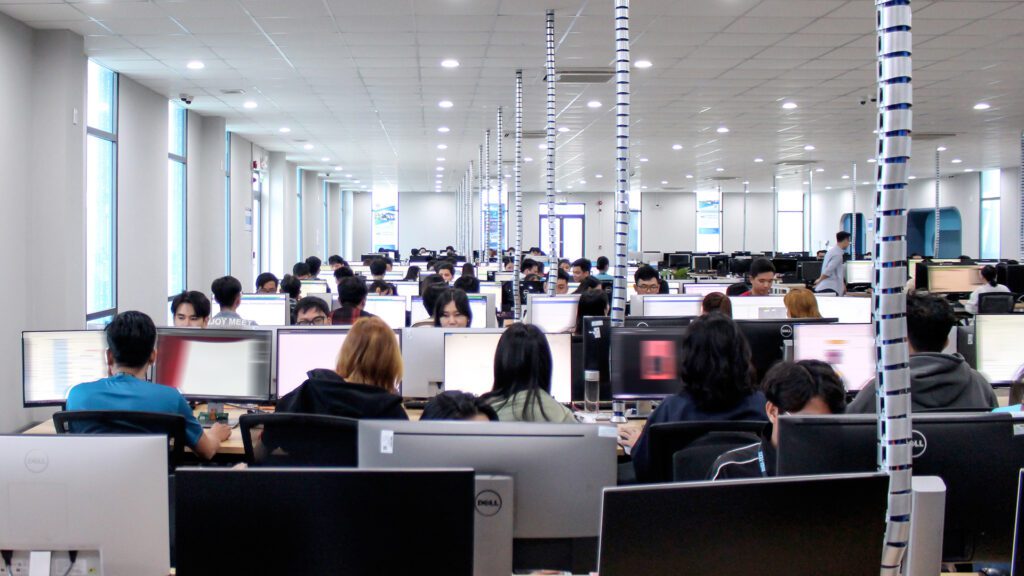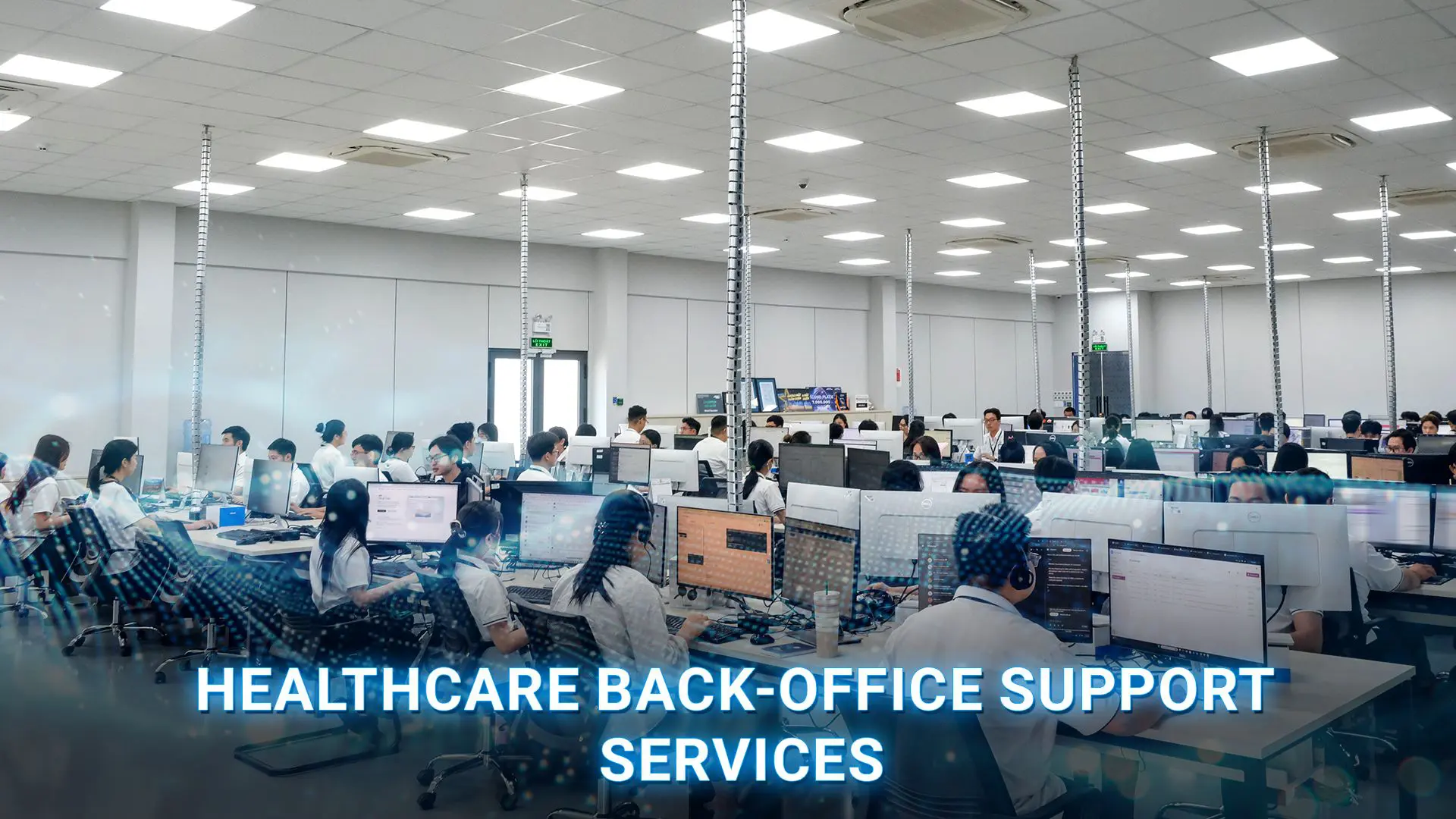All About the BPO Industry in Vietnam: The Rising Hub of the Global BPO Industry
The global Business Process Outsourcing (BPO) industry is not just growing; it’s transforming. (1) With a projected valuation of 739.4 Billion by 2033 USD, this dynamic sector is reshaping how businesses operate, allowing them to focus on core competencies while leveraging global specialized expertise.
While established players continue to thrive, a new star is rising in the East: Vietnam. With its strategic location, young population, and advanced infrastructure, this nation is rapidly becoming one of the world’s top BPO destinations.
It is a remarkable story of progress for the BPO sector in Vietnam. With the industry’s nascent beginnings just a few decades ago, it has grown to become a lively sector that attracts substantial foreign investment and creates a great deal of employment.

This growth is fueled by a confluence of factors, including competitive labor costs, a strong emphasis on education, and proactive government policies designed to foster a favorable business environment.
But Vietnam’s appeal extends beyond mere cost advantages. The country boasts a young, tech-savvy workforce that is increasingly proficient in English and other key languages, making it an ideal location for serving international clients.
This comprehensive guide will delve into the multifaceted world of the BPO industry in Vietnam. We will explore the key drivers behind its impressive growth, examining the specific advantages that make Vietnam such an attractive destination for outsourcing. We’ll also take a closer look at the diverse range of BPO services offered, from IT outsourcing and customer support to knowledge process outsourcing and specialized financial services.
Furthermore, we will address the challenges that the industry faces, including the ongoing need to improve English proficiency and retain top talent, as well as the immense opportunities that lie ahead, such as the potential to move up the value chain and embrace emerging technologies.
The Story of Vietnam BPO | Reaching New Height
It is a remarkable story of growth that has transformed Vietnam into a global player in the BPO sector. While the seeds of outsourcing were planted earlier, it’s in the last two decades that Vietnam’s BPO industry has truly blossomed, fueled by a potent mix of economic reforms, strategic investments, and a dynamic workforce. This section explores the key factors that have propelled Vietnam’s ascent in the BPO world.
Historical Context:

While Vietnam’s engagement with international business and services began in the late 20th century, its focused development as a BPO destination gained momentum in the early 2000s.
Initial forays into outsourcing were primarily driven by cost advantages, attracting basic data entry and low-skill tasks. However, as Vietnam’s economy opened up and its education system strengthened, the BPO sector began to diversify and move up the value chain.
The government recognized the potential of BPO as a driver of economic growth and job creation, leading to the implementation of policies aimed at attracting foreign investment and fostering the development of a skilled workforce.
Key Drivers of Growth:
Several interconnected factors have contributed to Vietnam’s impressive growth in the BPO industry:
| Cost-Effectiveness | Competitive labor costs were one of Vietnam’s primary attractions at first. In comparison to other established BPO destinations such as India or the Philippines, Vietnam offered significantly lower wages, making it an attractive option for businesses looking to reduce operating expenses. In many service areas, Vietnam still maintains a cost advantage despite some wage rises as the industry matures. (2) As of 2023, the average monthly salary for skilled workers in Vietnam is approximately USD 290, significantly lower than in developed nations. |
| Skilled Workforce | Beyond cost, Vietnam’s true strength lies in its young, educated, and increasingly English-proficient population. Every year, thousands of Vietnamese graduates enter the workforce as a result of the Vietnamese government’s emphasis on education. The BPO industry is also undergoing numerous training programs and initiatives to enhance English language skills and equip workers with technical expertise. By focusing on skills development, Vietnam is moving beyond basic outsourcing tasks and into higher-value services. (3) Vietnam has a growing capacity in foreign languages, with 11 officially taught at specialized universities. These include English, Chinese, French, Russian, Arabic, German, Japanese, Korean, Italian, Portuguese, and Spanish. Other languages are mostly taught at foreign language centers. This diverse offering reflects Vietnam’s increasing engagement with the global community. |
| Government Support and Infrastructure | The Vietnamese government has played a crucial role in nurturing the BPO industry through a range of supportive policies. These include tax incentives, streamlined business registration processes, and investments in infrastructure development. The Vietnamese government has actively promoted its IT and BPO sectors through a range of supportive policies. These include tax incentives, free trade agreements, and significant investments in infrastructure development. (2) A notable example is the $1.2 billion allocated in 2023 to enhance Vietnam’s digital infrastructure and further bolster the BPO industry. These initiatives, along with Vietnam’s membership in the Regional Comprehensive Economic Partnership (RCEP), have solidified its standing as a leading destination for outsourcing. The government’s proactive approach has created a stable and predictable business environment, attracting significant foreign direct investment (FDI) into the BPO sector. A robust and modern infrastructure is essential for the smooth operation of BPO activities. Vietnam has made substantial progress in developing its IT infrastructure, including high-speed internet connectivity, reliable telecommunications networks, and modern office spaces. |
| Political Stability | Vietnam’s stable political environment provides a sense of security and predictability for investors. This stability is a crucial factor for businesses considering long-term outsourcing partnerships, as it reduces the risk of disruptions and ensures a consistent business environment. |

Comparative Advantage:
While Vietnam is not the only country vying for BPO business, it offers a distinct set of advantages that differentiate it from its competitors.
| Feature/Country | Vietnam | China | India | Philippines |
| Cost | Moderately Competitive (Mid-range) | Variable, generally higher than Vietnam for many services, but can be competitive for specific high-volume or specialized tasks. | Highly Competitive (Lower end) | Moderately Competitive (High-range) |
| Skills | Growing rapidly, strong in IT, improving English | Very large talent pool, strong in engineering and manufacturing-related BPO, English proficiency varies. | Wide range of skills, established IT hub | Strong English proficiency, customer service focus |
| Time Zone | GMT+7 (Favorable for Europe, some US overlap) | GMT+8 (Good for Asia-Pacific, some US overlap) | GMT+5:30 (Good for Europe, less US overlap) | GMT+8 (Good for Asia-Pacific, some US overlap) |
| Cultural Compatibility | Relatively good for Western businesses, increasing familiarity | Can be a challenge for some Western businesses due to cultural and language differences. | Established experience with Western business culture | Strong Western cultural influence, familiarity |
| Infrastructure | Improving rapidly, modernizing | Highly developed, but can vary by region. | Generally good, variations across regions | Generally good, focus on call centers |
| Government Support | Strong, proactive policies | Significant government support for specific industries and technologies. | Varies by state, but generally supportive | Supportive, focus on the BPO industry |
| Talent Pool | Growing, focus on younger workforce | Extremely large, but the competition for skilled workers is intense. | Large and established talent pool | Large and established talent pool |
| Data Security | Increasing focus and regulations | Data security and regulations are evolving and require careful consideration. | Established data security practices | Established data security practices |
While the Philippines may have a stronger English-speaking population overall, Vietnam is rapidly closing the gap. Compared to India, for example, Vietnam offers a more manageable time zone for companies in Europe and North America, as well as a more culturally compatible business environment in some respects.
These comparative advantages position Vietnam as a highly attractive alternative for businesses seeking to diversify their outsourcing portfolio or explore new opportunities. This combination of factors, cost, skills, government support, infrastructure, and stability, sets Vietnam apart in the competitive global BPO landscape.
Top BPO Services Offered In Vietnam
Vietnam’s BPO sector has evolved significantly, moving beyond basic data entry and call center operations to offer a diverse range of services. This section explores the key categories of BPO services available in Vietnam, highlighting the country’s strengths and emerging trends.

Categorization of BPO Services:
Vietnam’s BPO offerings can be broadly categorized into three main areas:
IT Outsourcing (ITO): This segment is a cornerstone of Vietnam’s BPO industry, leveraging the country’s growing pool of skilled software developers and IT professionals. Vietnamese companies excel in:
- Software Development: From web and mobile applications to enterprise software and embedded systems, Vietnamese developers are gaining recognition for their technical expertise and agile methodologies.
- IT Support: Providing help desk services, network management, and technical support to businesses worldwide.
- Cloud Services: Offering cloud-based solutions, including cloud migration, infrastructure management, and application development.
- Testing and Quality Assurance: Ensuring the quality and reliability of software products through rigorous testing processes.
- Game Development: Vietnam is also emerging as a hub for game development and art outsourcing.
BPO: This category encompasses a wide range of administrative and operational tasks that businesses can outsource to Vietnam:
- Customer Service: Providing multilingual customer support via phone, email, and chat. While English proficiency is improving, Vietnamese BPO providers are also increasingly catering to clients requiring support in other languages.
- Data Entry and Processing: Handling large volumes of data with accuracy and efficiency.
- Document and Data Processing: This is a crucial area where Vietnamese BPO providers offer services like: data capture, document management, forms processing, data cleansing and validation, etc.
- Data Annotation: A growing area of BPO, especially with the rise of AI and machine learning. Vietnamese workers are providing data annotation services for: image annotation, text annotation, and video annotation.
- Finance and Accounting: Offering services such as bookkeeping, payroll processing, accounts payable/receivable management, and financial reporting.
- Human Resources Outsourcing (HRO): Managing HR functions like recruitment, training, and payroll administration.
- Back Office Operations: Handling administrative tasks such as document management, data archiving, and order processing.
Knowledge Process Outsourcing (KPO): This higher-value segment of BPO involves outsourcing knowledge-intensive tasks that require specialized expertise. KPO services in Vietnam are gaining traction in areas like:
- Research and Development (R&D): Conducting market research, product development, and scientific research.
- Data Analytics: Analyzing data to provide insights and support business decision-making.
- Legal Services: Offering legal research, document review, and other legal support services.
- Financial Analysis: Providing financial modeling, investment analysis, and risk management services.
- Healthcare BPO: Supporting healthcare providers with tasks like medical coding, claims processing, and data management.
Focus on Specific Strengths:
Vietnam’s BPO sector has developed particular strengths in certain areas. For example, the country is gaining a reputation for its agile software development capabilities, attracting clients who require rapid development cycles and flexible solutions. Furthermore, Vietnamese BPO providers are increasingly specializing in niche areas, such as [mention specific niche areas like fintech, e-commerce support, or specific programming languages]. This specialization allows them to offer highly tailored services to clients with specific needs.
Emerging Trends:
Several key trends are shaping the future of BPO in Vietnam:
- Increased Focus on Higher-Value Services: The industry is moving towards higher-value KPO services, leveraging the growing skills and expertise of the Vietnamese workforce.
- Adoption of Advanced Technologies: BPO providers in Vietnam are embracing technologies like AI, automation, and big data analytics to enhance efficiency and offer more sophisticated solutions.
- Growth of Niche BPO Services: Specialized BPO services are emerging to cater to specific industry needs, such as [mention examples of niche services].
- Emphasis on Data Security and Compliance: With increasing concerns about data privacy, Vietnamese BPO providers are investing heavily in data security measures and ensuring compliance with international regulations.
The diversification of services, the focus on higher-value activities, and the adoption of new technologies are positioning Vietnam as a sophisticated and competitive player in the global BPO landscape. As the country continues to invest in education, infrastructure, and innovation, its BPO sector is poised for further growth and development.
Challenges and Opportunities
Vietnam’s BPO industry has experienced remarkable growth, but its continued success hinges on addressing existing challenges and capitalizing on emerging opportunities. This section examines the key hurdles that Vietnam’s BPO sector faces and explores the promising prospects that lie ahead.

| Opportunities | Challenges |
| Growth of Fintech and Other Industries: The rapid growth of industries like Fintech, e-commerce, and healthcare creates new opportunities for BPO providers in Vietnam. These sectors require specialized BPO services, such as software development, data analytics, and customer support, which Vietnamese companies are well-positioned to provide. Focus on Higher-Value Services (KPO): Vietnam has the potential to become a hub for higher-value KPO services. By leveraging its growing pool of skilled professionals, Vietnam can expand its offerings in areas like R&D, data analytics, legal services, and financial analysis. Moving up the value chain will allow Vietnam to compete more effectively in the global BPO market. Leveraging Technology: Embracing new technologies like AI, automation, and cloud computing can significantly enhance the efficiency and competitiveness of Vietnam’s BPO sector. Adopting these technologies will enable BPO providers to offer more sophisticated solutions and attract clients who require cutting-edge services. Expanding into New Markets: While Vietnam has traditionally focused on serving clients in North America and Europe, there are significant opportunities to expand into new markets, such as Asia-Pacific and other regions. Diversifying its client base will make Vietnam’s BPO sector more resilient and less dependent on specific markets. Government Initiatives and Support: The Vietnamese government’s continued support for the BPO industry is a crucial driver of growth. Policies that promote investment, encourage skills development, and improve infrastructure will play a critical role in shaping the future of the sector. Further initiatives to streamline regulations, reduce bureaucracy, and foster innovation will also be beneficial. Data Annotation Boom: The increasing importance of AI and machine learning presents a significant opportunity for Vietnam in data annotation. This specialized area of BPO is experiencing rapid growth, and Vietnam’s young and tech-savvy workforce is well-suited to provide these services. | Talent Retention: As the BPO sector expands, competition for skilled workers intensifies. Attracting and retaining top talent is a significant challenge. BPO companies need to offer competitive salaries, attractive benefits packages, and opportunities for professional development to prevent employee turnover. Creating a positive and engaging work environment is also essential for retaining valuable employees. Data Security and Privacy: In today’s interconnected world, data security and privacy are paramount. With increasing concerns about data breaches and regulatory compliance, Vietnamese BPO providers must prioritize data protection. Investing in robust security infrastructure, implementing strict data governance policies, and complying with international standards (e.g., GDPR, ISO 27001) are critical for building trust and attracting clients who handle sensitive data. Competition: Vietnam faces stiff competition from other BPO destinations in the region and globally. Countries like India, the Philippines, and Malaysia are also actively vying for BPO business. Vietnam needs to continuously innovate, differentiate its offerings, and focus on providing high-quality, specialized services to maintain its competitive edge. Scaling and Management Skills: As the industry grows, managing large teams and complex projects becomes increasingly important. Developing strong management skills and leadership capabilities within the BPO workforce is crucial for scaling operations effectively and ensuring smooth project execution. Infrastructure Gaps (Localized): While overall infrastructure has improved dramatically, there might still be localized infrastructure gaps, especially in less developed areas. Ensuring consistent and reliable internet connectivity, power supply, and transportation infrastructure across the country is vital for supporting the continued expansion of the BPO sector. |
The Future of BPO in Vietnam | Bright Opportunities Ahead
The future of the BPO industry in Vietnam looks bright, driven by a confluence of favorable factors and emerging trends. While challenges remain, the country’s strategic advantages and proactive approach position it for continued growth and evolution in the global BPO landscape.
Looking ahead, Vietnam’s BPO industry is poised for continued expansion and transformation. By embracing innovation, focusing on higher-value services, and addressing the remaining challenges, Vietnam can solidify its position as a leading global BPO destination. The future of BPO in Vietnam is not just about cost-effectiveness; it’s about providing high-quality, specialized solutions and becoming a trusted partner for businesses worldwide.


